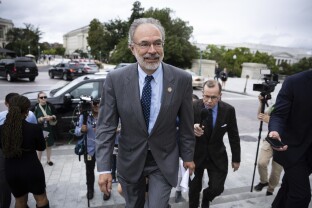House Republican leadership reached an overnight deal with GOP hard-liners to advance three crypto-related bills, which are now expected to get a floor vote on Thursday.
After days of deadlock in what they called “crypto week,” House Republicans expect to vote on the GENIUS Act, the Senate-led bill intended to codify stablecoin payments, and two additional cryptocurrency-related bills on Thursday.
It’s making for a stacked day of House business for Republicans, as they also have to consider the rescission bill sent back by the Senate early Thursday before the period to pass the bill expires at the end of Friday.
House Majority Leader Steve Scalise’s office responded to a NOTUS inquiry about whether the rescission bill would change their timing with a link to the leader’s schedule, which shows all three pieces of cryptocurrency legislation on deck for the day.
Rep. Mike Flood of the House Financial Services Committee told NOTUS on Thursday morning he is optimistic about the GENIUS Act passing with broad bipartisan support. It was expected to easily clear the House after the arduous process it went through to pass in the Senate, but it hit procedural roadblocks as conservatives demanded it be combined with other legislation.
All of this is playing out as Republicans work to meet an August deadline set by President Donald Trump for Congress to deliver legislation regulating the cryptocurrency market to his desk.
In addition to the GENIUS Act, House Republicans expect to vote on the CLARITY Act, intended to regulate the broader digital assets market, and the Anti-Central Bank Digital Currency Surveillance State Act, a bill that would ban the Federal Reserve from issuing digital currencies, on Thursday.
Politico reported on Wednesday that House leadership reached an overnight deal with GOP hard-liners and Senate leadership. House and Senate Republican leadership agreed to have individual votes for all three bills, after which they plan to attach the Anti-CBDC Surveillance State Act to the National Defense Authorization Act in the Senate once it’s passed by the House. It’s an agreement that will clear the way for a final vote.
Andy Harris, House Freedom Caucus chair, wrote on X that this agreement was a “significant win for the American people.”
“By securing these protections, we will be taking a critical step to stop government overreach and to preserve individual liberty,” Harris added. “This is exactly why the House Freedom Caucus fights— Freedom is our middle name — and we will continue to fight to protect the rights of Americans every day.”
Despite Harris’ celebratory tone, the Anti-CBDC Surveillance State Act is a partisan bill that would become a provision in the NDAA. That means it could be stripped out by senators at any point in the legislative process.
It’s a major tone shift for Harris and his caucus. Earlier this week, House Freedom Caucus members blocked a vote for the GENIUS Act and the two digital assets bills, demanding that the three be packaged together and sent back to the Senate.
Reps. Glenn Thompson and French Hill, chairs of the committees with jurisdiction over the bills, opposed doing so, worried that they would lose bipartisan support for the GENIUS Act and the CLARITY Act.
On Wednesday, Speaker Mike Johnson left a procedural vote to advance the bills open for more than nine hours to negotiate with Republican holdouts. Their main request was to strengthen the likelihood of the Senate picking up the Anti-CBDC Surveillance State Act by attaching it to the NDAA, a must-pass piece of legislation.
Rep. Dusty Johnson, a member of the House Committee on Agriculture and a sponsor of the CLARITY Act, told reporters on Wednesday that there was broad agreement among House Republicans that they need to pass the Anti-CBDC Surveillance State Act.
“A government that controls the currency to a digital level is able to reduce the privacy and the freedoms of Americans,” Johnson said. “Everybody knows that we need to pass anti-CBDC legislation into law to shut the door on that kind of bad potential behavior.”
Sign in
Log into your free account with your email. Don’t have one?
Check your email for a one-time code.
We sent a 4-digit code to . Enter the pin to confirm your account.
New code will be available in 1:00
Let’s try this again.
We encountered an error with the passcode sent to . Please reenter your email.


